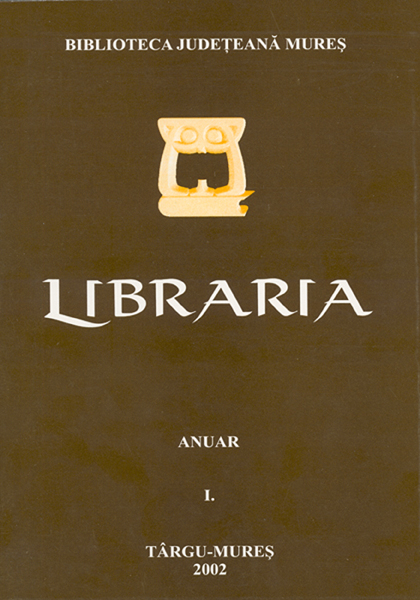Valenţele hermeneutice ale lecturii
The hermeneutic valences of reading
Book. Reading. Library.
Author(s): Liliana MoldovanSubject(s): Library and Information Science, Other
Published by: Biblioteca Județeană Mureș
Keywords: Libraria; Biblioteca Județeană Mureș; biblioteconomie; bibliologie; carte veche; carte bibliofilă; istorie locală; servicii de bibliotecă; Biblioteca Teleki; carte veche românească;
Summary/Abstract: Out of numerous paradigmes about writer-reader relation, drawn up during centuries by various specialists in reading theories, the hermeneutical one is probably the most attractive and submitted to controversary.Beginning whit the early 60’s of the last century, philosophers and philologists have focused on reading as an act of interpretation. In this context they made difference between pasive and active reading. The semiological theory considers that the act of reading means, first of all, interpretation, and this is pre-eminently active. An active reader will accept, as such, the idea that every paper, written or printed, no matter the information it includes, is to be seen a text free of constrain and liable to many interpretations.The text is changed into a genuine teleologycal process by interpreting it and is carried out in order to find out the “captured” meaning of the text. Bringing out to light senses and secret meanings of a book or another depends both on how difficult the text we read is, and the quality of the comprehensive process and the latter one, as well, on the reader’s native intelligence and general education. We all use to read by keeping a “code of culture” inside us, desciphering trough this the familiar terms of a text and trying to get meanings of the new concepts, inaccesible to our understanding. Taking into consideration what is already known, we finaly succed in revealing the writer’s real message in the paper. As a results, the “hermeneutical” reading runs through 3 stages: firstly, we understand the text, then make it actual and finally we interpret it.A fiction work is estimated in a specific manner, a history book or a philosophical essay is estimated in a different way. By reading an aesthetical text there is a psychological connexion between the author of the book and the reader. Reading itself becomes a private matter and the one going through a prose or poetry volume discovers more convenient senses, being able this way to find another definition of reality, a definition which confers on this new aesthetical an existential values. There is a different story in case of someone interested in philosophie. This one should realise that the philosophical reading is pre-textual so it needs somehow the philosopher terminology to be know, a deep aknowledge of principles rulling the work orientation he belongs to.In conclusion, if hermeneutics shows us its own story from the inside writing and in case the act of reading is exclusively a process of interpretation, that means the reader is a hermeneutical one, always seekingafter new meanings, always being fascinated by the expresive power of words.
Journal: Libraria. Studii și cercetări de bibliologie
- Issue Year: I/2002
- Issue No: 1
- Page Range: 254-260
- Page Count: 7
- Language: Romanian

